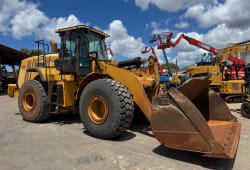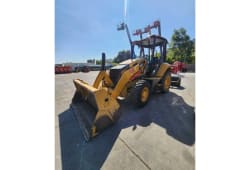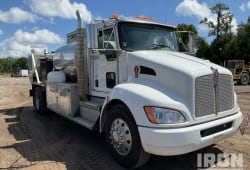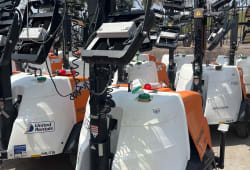A Full Guide to Peak Performance in Winter Weather
10 Lectura mínima
)
enero 20, 2024
As the temperature drops, it becomes crucial to ensure that your heavy equipment is adequately prepared to withstand the challenges posed by winter weather conditions.
In this comprehensive guide, we will delve into best practices for winterizing your machine, covering both operational and seasonal storage considerations.
From coolant and fuel conditioners to block heaters and maintenance routines, we've got you covered to ensure optimal performance and prevent costly repairs.
Coolant Compliance and Concentration
To ensure optimal performance of your machinery during peak winter conditions, adhere to these key guidelines for coolant compliance and concentration:
ASTM Standard D-621 Compliance: Initiate your winterization process by confirming that your coolant aligns with the ASTM Standard D-621. This standard delineates the requisite chemical composition and performance criteria for coolants, ensuring their efficacy in extreme temperatures.
Freeze Point Verification: Thoroughly inspect the label on your coolant to verify its freeze point. The freezing point must be tailored to the specific climate in which your machinery operates. Inadequate freeze protection can result in frozen coolant, potentially causing engine block cracks and necessitating costly repairs.
Fluid Analysis Techniques: Employ fluid analysis methods such as refractometer or hydrometer tests to ascertain and uphold the optimal coolant concentration levels. Maintaining the correct concentration is paramount in safeguarding your engine against the detrimental effects of both freezing and overheating.
By meticulously adhering to these measures, you can mitigate the risk of winter-related damage to your machinery and ensure its uninterrupted functionality in the harshest winter conditions.
Fuel Conditioner for Engine Protection
In peak winter, the necessity for a Fuel Conditioner for Engine Protection becomes paramount to safeguard your engine from the adverse effects of freezing temperatures. Here are essential details to consider:
Preventing Fuel Freezing A fuel conditioner plays a crucial role in preventing fuel from freezing, which can impede the proper functioning of your engine. It contains additives that lower the freezing point of the fuel, ensuring it remains in a liquid state even in extremely cold weather.
Facilitating Smooth Engine Starts The fuel conditioner not only prevents freezing but also facilitates smooth engine starts in cold conditions. It enhances the combustibility of the fuel, ensuring a reliable ignition process even when temperatures are at their lowest.
Manufacturer's Recommendations Adhere to the manufacturer's recommendations regarding the appropriate amount of fuel conditioner needed for your specific engine. Overuse or underuse can impact its effectiveness, so precise application is crucial for optimal results.
Fuel Compatibility Ensure that the fuel conditioner is compatible with the type of fuel you are using. Different fuels, such as low sulfur variants, may require specific formulations of fuel conditioners to guarantee optimal performance in cold conditions.
By incorporating a suitable Fuel Conditioner for Engine Protection and following these guidelines, you fortify your engine against winter-related challenges, promoting reliable and efficient operation even in the coldest climates..
Preventing Fuel Filter Issues
Preventing fuel filter issues during peak winter is essential for the optimal functioning of your equipment. Here's a detailed guide to ensure a trouble-free fuel system:
Moisture Buildup Prevention Regularly inspect and replace fuel filters to prevent moisture buildup in the fuel. Clogged filters can lead to excessive moisture accumulation, causing equipment malfunctions and difficulties in starting, especially in cold weather conditions.
Emptying Water Traps Take a proactive approach by emptying water traps in fuel filters before the arrival of cold temperatures. This preventive measure eliminates accumulated water, reducing the risk of freezing and ensuring smooth fuel flow. Frozen water in the fuel system can result in operational issues and potential damage to your equipment.
Carry Spare Fuel Filters Minimize downtime by keeping an extra set of fuel filters in your cab. This precaution allows for quick and efficient replacement in case of filter clogging. Having spare filters readily available ensures that your equipment remains operational, even in challenging winter conditions, promoting uninterrupted productivity.
Regular Maintenance Implement a routine maintenance schedule for your fuel system, emphasizing the regular inspection and timely replacement of fuel filters. Proactive measures, such as replacing filters before they become excessively clogged, contribute to the overall efficiency and reliability of your equipment throughout the winter.
By following these preventive measures diligently, you can effectively mitigate the risk of fuel filter issues, guaranteeing a consistently efficient fuel system performance during peak winter conditions.
Ether Systems for Cold Starts
Ensuring effective Ether Systems for Cold Starts is paramount in optimizing the performance of diesel engines during peak winter conditions. Here are detailed guidelines to facilitate smooth cold starts:
Diesel Engine Assistance In cold temperatures, diesel engines rely on ether to aid in the starting process. This is particularly crucial for efficient ignition in chilly weather, preventing delays and ensuring prompt engine startup.
Older Equipment with Ether Spray Bottles For older equipment equipped with ether spray bottles, it is essential to verify that these containers are not empty. Regularly check the ether levels to guarantee an adequate supply, preventing potential starting issues due to insufficient ether during cold weather.
Newer Equipment with Automatic Ether Systems Modern equipment often features automatic ether systems. Verify the connections and hoses for any signs of cracks or wear. A meticulous inspection ensures the proper functioning of the automatic ether system, crucial for a reliable cold start in winter conditions.
Preventive Maintenance Implement a proactive maintenance routine, especially before the onset of winter. This includes checking and refilling ether spray bottles as needed and conducting a thorough examination of automatic ether systems to identify and address any potential issues before they impact engine performance.
By adhering to these guidelines, you can enhance the reliability of Ether Systems for Cold Starts, guaranteeing efficient engine ignition and minimizing the risk of delays or malfunctions, particularly in the challenging conditions of peak winter.
Block Heaters for Temperature Regulation
In peak winter, the effectiveness of Block Heaters for Temperature Regulation is paramount in preserving the operational efficiency of heavy machinery. Here are comprehensive details on how block heaters impact heavy machinery in cold weather:
Temperature and Viscosity Maintenance Block heaters play a crucial role in ensuring optimal fluid temperatures and viscosity. By warming the engine block and fluids, these heaters prevent the thickening of oil and maintain the proper flow characteristics required for the smooth operation of heavy machinery in frigid conditions.
Preventing Engine Stress A malfunctioning block heater can lead to thickened oil, increasing the difficulty of turning the engine over. This places undue stress on the battery and may result in operational challenges. Regular verification of the block heater's functionality is essential to prevent such issues and maintain the overall health of the engine.
Minimizing Cold-Start Challenges Block heaters significantly reduce cold-start challenges by preheating the engine components. This ensures that the heavy machinery can start reliably even in extremely cold temperatures, preventing potential delays and operational disruptions.
Verification of Functionality To confirm the block heater's effectiveness, plug it in and check for warm hoses. This visual confirmation assures operators that the block heater is functioning as intended, providing the necessary warmth to the engine components and fluids.
Battery Maintenance & Storage
Effective Battery Maintenance is crucial for preventing corrosion and ensuring reliable performance in heavy machinery. Here are detailed guidelines for maintaining batteries and recommendations for storage:
Corrosion Prevention
Periodic Inspections: Conduct regular inspections for corrosion around battery connections. Corrosion reduces voltage transmission and increases strain on the battery.
Timely Addressing: Promptly address any corrosion issues detected during inspections. This proactive approach contributes to a more reliable and durable battery life.
Battery Storage Recommendations
Avoid Discharged Batteries: Refrain from storing discharged batteries, especially during winter. Colder temperatures can slow down the discharge rate of fully charged batteries, prolonging their life.
Optimal Readiness: Storing fully charged batteries ensures they are ready for use when needed, preventing potential issues related to reduced charge capacity during cold weather.
By adhering to these battery maintenance practices and storage recommendations, you can mitigate corrosion-related problems, optimize battery performance, and enhance the overall reliability of heavy machinery, particularly during challenging winter conditions.
Fuel Tank Considerations
Ensuring proper Fuel Tank Considerations is paramount for heavy machinery equipped with diesel engines during peak winter. Here are detailed guidelines for winter storage:
Draining the Tank
Eliminating Condensation: Draining the fuel tank eliminates the risk of condensation, which can lead to water accumulation. This preventative step safeguards against potential issues with fuel filters, lines, carburetors, and injectors.
Prevention of Winter-Related Problems: Condensation in the fuel system during winter can cause damage to various components, leading to costly repairs. Draining the tank minimizes the risk of winter-related problems, ensuring the machinery is ready for trouble-free startup in the spring.
Leaving the Tank Full
Preventing Air Exposure: Keeping the fuel tank full reduces the exposure of air inside the tank, minimizing the potential for condensation to occur. This method offers an alternative approach to addressing winter storage concerns.
By carefully considering whether to drain the fuel tank or leave it full, heavy machinery operators can implement a proactive strategy that best suits their equipment, mitigating the risk of winter-related issues and preserving the optimal functionality of the fuel system.
Post-Cleaning Engine Operation
After cleaning the engine and replacing the oil, it is essential to run the machine. This allows a protective oil film to coat internal parts, acting as a rust preventative. Additionally, before an operation, pour a 50/50 mixture of water and antifreeze into the coolant system to protect it down to -34°F, ensuring the cooling system functions optimally in extremely cold temperatures.
Regular Machine Startup
To maintain equipment readiness, start your machine once a month. Choose a day with temperatures above freezing to avoid complications and operate the hydraulics for a brief period. This practice ensures that essential components remain in good working condition and reduces the risk of mechanical issues during prolonged periods of inactivity.
Conclusion
By following these comprehensive machine winterization tips, you can safeguard your heavy equipment from the harsh challenges of winter. Implementing these best practices not only ensures optimal performance but also prevents potential damage and costly repairs. Prioritize winterization to extend the lifespan of your machinery and maintain peak efficiency in cold weather conditions.

Caleb Woods is an experienced content specialist and an editor at Boom & Bucket, blending his journalism background with expertise in the heavy equipment industry. He delivers engaging, informative content to help professionals stay informed and make smarter decisions in the machinery market.














